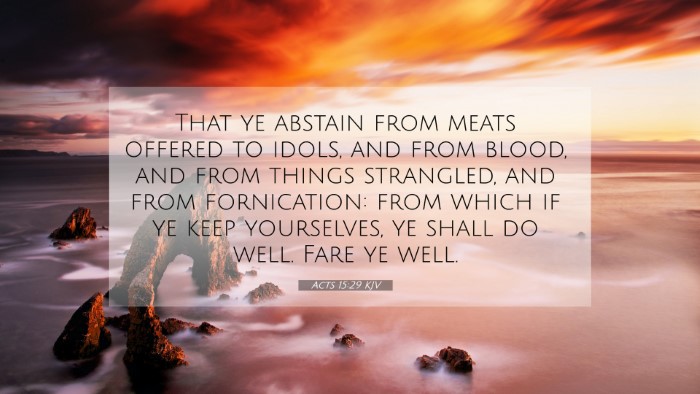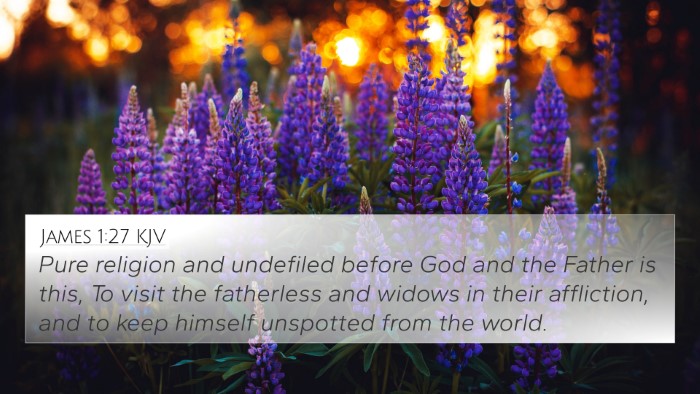Understanding Acts 15:29
In Acts 15:29, the apostles and elders provide guidance to the early Church regarding essential practices necessary for believers. This verse emphasizes the importance of abstaining from certain practices that could lead them away from their faith, and highlights a communal approach to Christian living.
Verse Analysis
According to various public domain commentaries, such as those by Matthew Henry, Albert Barnes, and Adam Clarke, Acts 15:29 serves as a pivotal moment in the early Christian community. The verse reads:
“That you abstain from things offered to idols, from blood, from things strangled, and from sexual immorality. If you keep yourselves from these, you will do well. Farewell.”
Key Themes
- Abstaining from Idolatry: The directive to abstain from food offered to idols is a call to maintain purity in worship and avoid practices associated with pagan religions.
- Respect for Life: The prohibition against consuming blood and strangled animals emphasizes the sacredness of life and obedience to God's commandments as outlined in the Mosaic Law.
- Sexual Morality: The warning against sexual immorality highlights the ethical standards expected of believers, reflecting the holiness to which they are called.
Commentary Insights
Matthew Henry comments on the unity and love demonstrated by the early church leaders in their decision-making process. He explains that the guidelines established were not only for the Jewish converts but also considered the Gentiles' backgrounds and practices.
Albert Barnes elucidates that these restrictions were critical in maintaining the integrity of the Christian witness amidst a diverse audience, advocating for a balance between liberty and moral responsibility.
Adam Clarke details that the instructions were practical and served to cement a cooperative relationship among different cultural groups within the church while promoting a shared standard of conduct.
Cross-References
Understanding Acts 15:29 can be enriched through various Bible verse cross-references that highlight its significance:
- 1 Corinthians 8:4-13: Discusses food offered to idols and the impact of knowledge on faith.
- Leviticus 17:10-14: Indicates the prohibition of consuming blood, which is echoed in the New Testament directives.
- Revelation 2:14: Warns against false teachings that encourage idolatry and immorality.
- Galatians 5:19-21: Lists acts of the flesh which include sexual immorality, emphasizing moral living.
- Romans 14:21: Highlights the principle of not causing others to stumble through one’s actions regarding food.
- Acts 21:25: Reiterates the same guidelines to the Gentile believers in writing and affirms their importance.
- Matthew 5:17-19: Jesus speaks to the continuity of the law and its ethical implications for believers.
- Ephesians 5:3: Encourages believers to avoid immorality and impurities, aligning with the teachings in Acts 15.
- James 1:27: Advocates for pure religion, including the care for others and moral purity.
- 2 Corinthians 6:17: Calls believers to come out from among worldly practices and be separate.
Connections Between Bible Verses
The connections between Acts 15:29 and the referenced verses illustrate a thematic continuity throughout Scripture regarding holiness, community, and ethical behavior. These verses enhance our understanding of early Christian principles, showing that the call to holiness is not restricted to the Old Testament context but is reinforced in New Testament teachings.
Comparative Bible Verse Analysis
By engaging in comparative Bible verse analysis, it becomes evident that Acts 15:29 forms a critical link between the Old and New Testament teachings. The historical context provides a backdrop against which the modern believer can evaluate personal conduct and communal engagement with others in faith.
Tools for Bible Cross-Referencing
Utilizing tools for Bible cross-referencing can greatly enhance one’s study experience. These tools, including Bible concordances, reference guides, and cross-reference systems, allow Christians to explore inter-Biblical dialogue and thematic Bible verse connections effectively.
Conclusion
Acts 15:29 stands as a vital teaching for believers, urging them to engage in lives marked by ethical standards that resonate with sacred commitments. Through the collective weight of Scripture, this passage offers guidance that is as relevant now as it was in the early church, promoting a unified approach toward faith and practice.




















